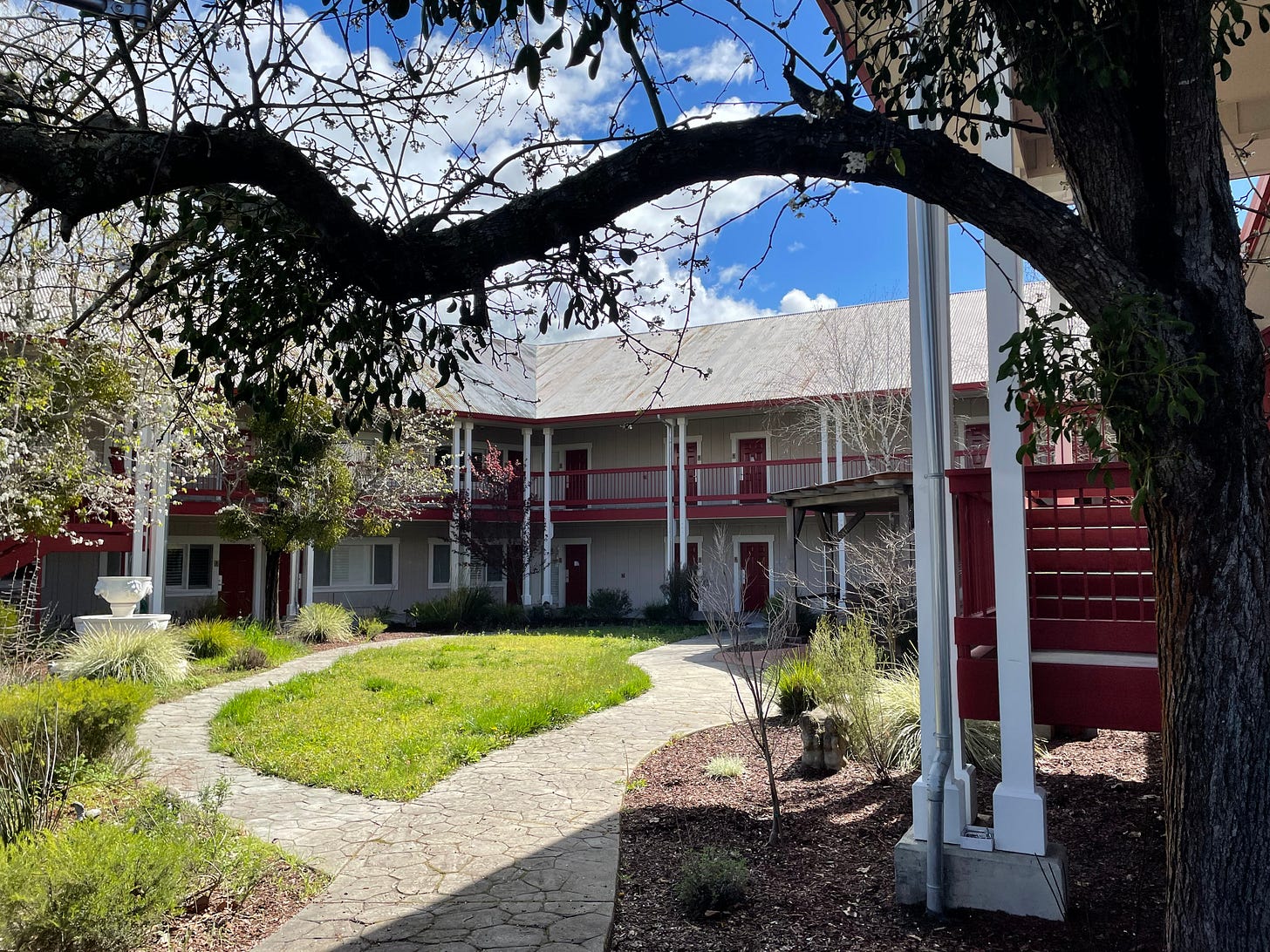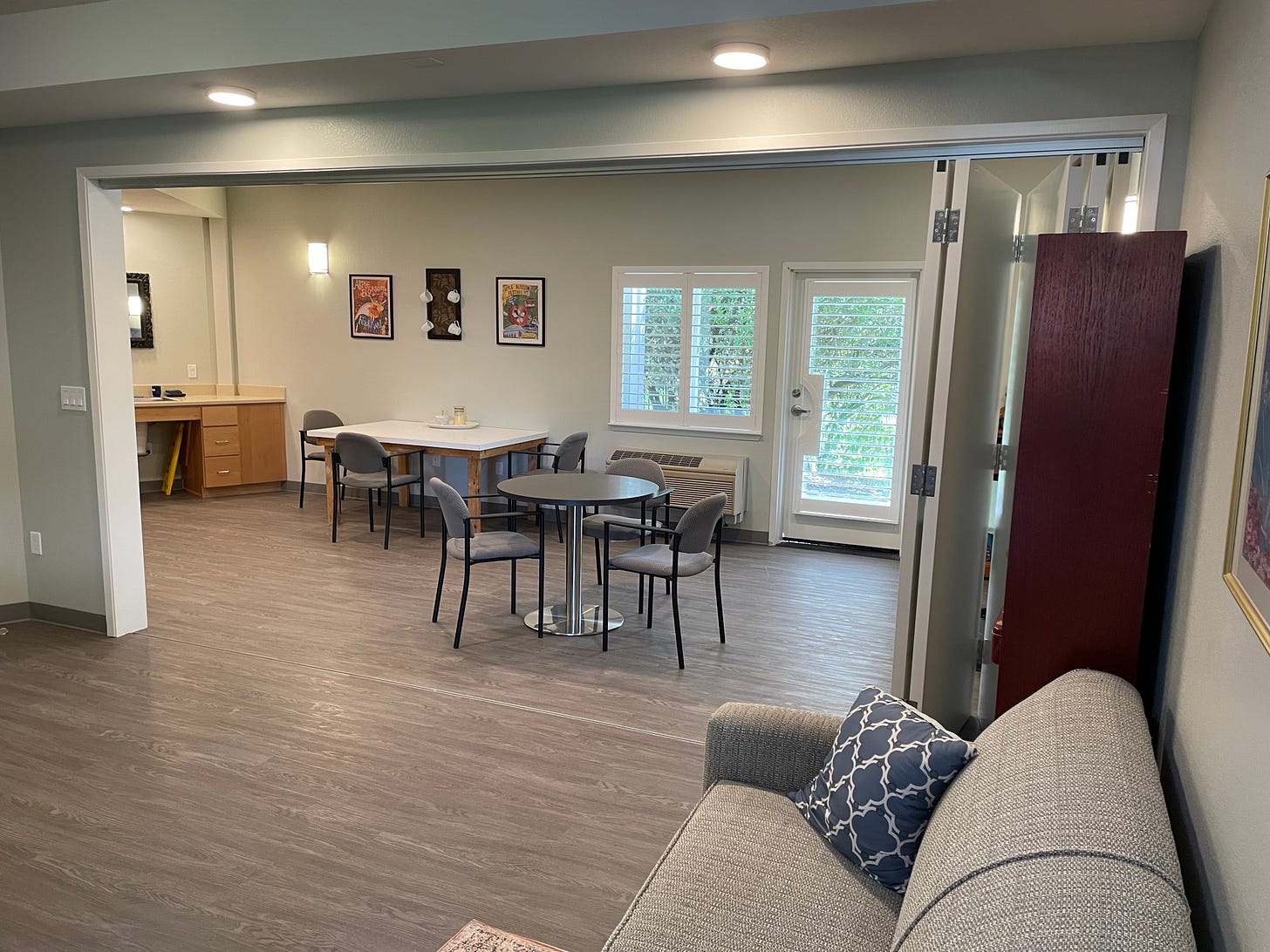Tenants move in to Elderberry Commons
This all-age housing complex caters to vulnerable, formerly homeless individuals ranging from mothers with children to disabled seniors and everything in between
Last week, tenants began moving into Elderberry Commons, a permanent supportive housing complex, tucked behind the Gravenstein Station shopping center on Sebastopol Avenue (Hwy. 12). Formerly known as the Sebastopol Inn, the building has now been renovated into 31 studio apartments for the homeless and the property’s onsite managers.
“Lease-up started last week, and there’s around a dozen units occupied now. We expect full occupancy around the end of the month,” said Mark Krug, portfolio analyst for Burbank Housing, which now owns the site after receiving it from the County of Sonoma in July 2024.
The county purchased the building and property in December 2020 for $6,375,000. Funding came from Project Homekey, a program of California’s Department of Housing and Community Development. According to Krug, renovations cost $2.48 million.
Who’s moving in?
Krug said all new residents came through Sonoma County’s Coordinated Entry (CE) system. “It’s a county-wide service that maintains lists of homeless people for just these kind of things—referring to services and housing placements. Funding sources usually require that all referrals come from CE, and that is the case here; the state HomeKey funding that aided in the acquisition and renovation of the property requires using CE exclusively for referrals.”
“CE organizes the lists by vulnerability,” Krug continued, “meaning that people who have the highest scores on a vulnerability assessment, i.e. the most vulnerable, are given a priority by being at the top of the list. In practice, that means that referrals will typically be people that are chronically homeless, many elderly, and many folks with disabilities and/or major health issues.
Wraparound Services
Wraparound services at Elderberry Commons are provided by West County Community Services (WCCS). The housing manager for Elderberry Commons is Seamus McChesney, who said she and her staff provide full case management for the residents.
“So for instance, staff worked with folks to get their deposit subsidized if they needed that, and with that also came a gift card so they could get some things for their new home. Because our folks are the most vulnerable homeless folks in the county, when we were getting the referrals, these are folks that maybe need IHSS workers [personal care workers] so we’re helping them through that process. We’re just trying to make it so that they have the support they need to be successful,” she said.

“I know that one of our residents—I’ve known her for five years—and she’s been on the street all that time,” McChesney said. “And so when you have been on the street or living in your car, it can be a rough transition to be able to close the door and be all by yourself. And so we try and ease that a little bit.”
The staff is throwing a Meet Your Neighbor party soon so the residents can get to know one another.
“I believe we’re all interdependent on our communities. We’re all looking out for each other. There’s nothing that we can do really all by ourselves,” McChesney said. “And so maybe the two folks who have toddlers can meet each other, become friends, maybe exchange childcare. Maybe our seniors want to go together to the Senior Center, so we want them to meet each other and support each other.”
McChesney said they can also help connect residents up with WCCS’s transition staff and peer counselors, who are trained to help formerly homeless people as they transition into safe, affordable housing.
“We’re just really trying to meet folks where they are, find out what their needs are, and then try and meet those so that they can be successful in housing,” she said.
Talia Beaumont is the WCCS’s Services Navigator at Elderberry. She’s in charge of connecting residents with the services they need in the community.
“I want to help get everyone signed up for library cards,” Beaumont said. “They have a lot of free events over there, and so we’re going to have the calendar of events posted so everyone can be engaged in their community. I would like to see who wants to sign up for the Senior Center and help them navigate that process. And then we have, people that have children, and so I’m trying to see if they want to get their children signed up for Head Start. So it’s really about individualized care for each person and seeing what they need.”
The team also helps residents make it to their doctor’s appointments, and get signed up for Medi-Cal and CalFresh (if they’re not already signed up). The staff is also talking with the folks at the food pantry at St. Stephen’s Episcopal, with the goal of having residents make food orders and then staff will go pick those up and distribute them back at Elderberry.
Residents of Elderberry Commons also get free internet, thanks to a March 11 decision by the Board of Supervisors to give free internet for one year for 556 low-income Sonoma County households using the American Rescue Plan Act funding. Elderberry Commons was one of ten affordable housing locations in the county selected to receive free internet.
Rules for living
Because Elderberry Commons is dealing with a special population, we asked if there were any particular rules for tenants.
“The rules here at Elderberry Commons are pretty much the same as any lease for an apartment,” McChesney said. “The kinds of infractions that can get you ‘kicked out’ are the same as any other apartment complex: violating their lease. Each resident has signed a 12-month lease with Burbank Housing.”
“We’re trying to not have that happen,” she said, “So you know, we’ll say, ‘I’m seeing that this is happening. What can we do? We don’t want your housing jeopardized. So how can we support you to change this behavior?’”
“What we try to do is observe behavior that might lead to a lease violation and intervene with resources that would help the resident address the behavior (car repair on site, rent assistance, behavioral health resources, etc.).”
Concerning rules about drugs and alcohol, she said, “We are not a ‘wet’ or ‘dry’ facility in that we do not search people, drug test, etc. Folks here have all the rights of a tenant anywhere else.”
“In Sonoma County, agencies serving the homeless members of our community are all operating on a ‘Housing First’ philosophy,” McChesney explained. “It is very difficult to address behavioral/mental/physical health needs when someone is living in a bush by a creek.”
McChesney is protective of her new tenants. She hopes Sebastopol residents will welcome them as they would any other new person in town.
“We want to be the best neighbors possible,” she said.






The renovation was required to add kitchenettes, which allowed the former hotel rooms to qualify as permanent supportive housing.
Good article. Nice to read something "constructive" during this maelstrom of "bad things from poor governance". And BRAVO to McChesney, Nelson and Beaumont.